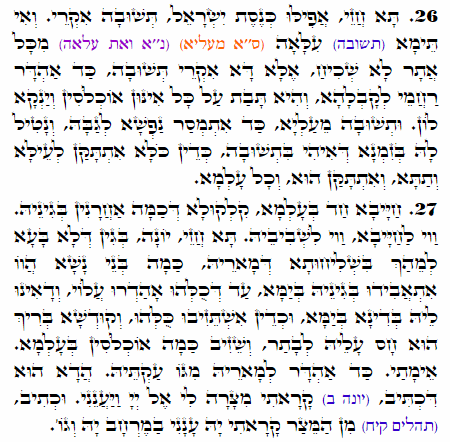Daily Zohar # 1832 – Naso – Teshuva

.
Hebrew translation:
27. רָשָׁע אֶחָד בָּעוֹלָם – בִּגְלָלוֹ יֵשׁ קִלְקוּל לְכַמָּה אֲחֵרִים. אוֹי לָרָשָׁע, אוֹי לִשְׁכֵנוֹ! בֹּא רְאֵה, יוֹנָה, מִשּׁוּם שֶׁלֹּא רָצָה לָלֶכֶת בִּשְׁלִיחוּת רִבּוֹנוֹ, כַּמָּה אֲנָשִׁים הָיוּ אוֹבְדִים בִּגְלָלוֹ בַּיָּם, עַד שֶׁכֻּלָּם חָזְרוּ עָלָיו וְדָנוּ אוֹתוֹ בְּדִין בַּיָּם, וְאָז נִצְּלוּ כֻלָּם, וְאַחַר כָּךְ הַקָּדוֹשׁ בָּרוּךְ הוּא רִחֵם עָלָיו, וְהִצִּיל כַּמָּה אוּכְלוּסִים בָּעוֹלָם. מָתַי? כְּשֶׁחָזַר לְרִבּוֹנוֹ מִתּוֹךְ צָרָתוֹ. זֶהוּ שֶׁכָּתוּב (יונה ב) קָרָאתִי מִצָּרָה לִי אֶל ה’ וַיַּעֲנֵנִי. וְכָתוּב (תהלים קיח) מִן הַמֵּצַר קָרָאתִי יָּהּ עָנָנִי בַמֶּרְחָב יָהּ וְגוֹ’.
.
Zohar Naso
Continued from previous DZ
Deuteronomy 21:23
“לֹא-תָלִין נִבְלָתוֹ עַל-הָעֵץ, כִּי-קָבוֹר תִּקְבְּרֶנּוּ בַּיּוֹם הַהוּא–כִּי-קִלְלַת אֱלֹהִים, תָּלוּי”
“his body shall not remain all night on the tree, but you shall bury him the same day, for a hanged man is cursed by God”
The English translation is corrupted and it doesn’t reveal the deeper meaning.
What the Torah tells us here is that we should bury the dead on the same day. The dead is under the control of the other side and they can use any little judgment against him. His soul begins to suffer because it doesn’t have the opportunity to go in front of the higher court. The soul is ‘hanging’ in the lower levels and only after burial it can start the ascending process.
I brought this verse to help us understand the importance of making immediate Teshuvah. Whatever we do during the day is carried with the soul to the upper levels during sleep and registered in our ‘records’. If we do Teshuvah on the same day we clear the issue, in most cases, and avoid the process of correction that follows an open ‘case’.
If for some reason people got hurt because of us, knowingly or unknowingly, then we should make immediate correction by asking for honest forgiveness. We should make that person happy again because if his consciousness is still carrying the pain then the ‘sin’ is not cleared.
Before going to sleep we should have a personal account of our daily actions. If we found anything that needs to be corrected then we should act upon it immediately and plan steps to make the correction on the next day or as soon as possible.
As we studied previously (DZ 1830), we are responsible for actions that may put others in potential harm.
We should also forgive those who caused us some kind of harm. Holding open issues keeps us on the judgment side, and it could affect us negatively no matter how just is our case. Before going to sleep we should make plans to correct any pain we may have caused to another person. It will help to clear a spiritual path for our soul to the upper levels, with less judgments.
{||}

 Previous: Naso
Previous: Naso

